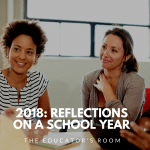Have you signed up for The Educator’s Room Daily Newsletter? Click here and support independent journalism!
Our department spent the month of May preparing and presenting our summer reading assignments to every high school student. We talked about our educational goals for the next school year. We shared advice and insight into how the selected summer reading could help us get a head start on the following school year.
Then one teacher in our small department of five left, which entirely shifted who was teaching what. By the end of the summer, most of us were teaching classes with summer reading that we had not assigned ourselves.
After years of assigning summer reading to my Pre-AP, AP Language, and AP Literature students, I stood in front of a classroom full of American Literature students who had clearly not completed their summer reading. This did not help start my classes off on the right foot. The assigned reading had nothing to do with the class material I planned to cover at the beginning of the year. By the end of the semester, the assignment accompanying the reading would not matter in the point totals. For those few who completed the reading, it was a waste of their time and mine. For those who did not complete the reading, it did not have any impact on their learning whatsoever.
This experience forced me to question everything I ever believed about the advantages of assigning summer reading. That same school year, COVID turned everything else upside down. Our department decided to forgo summer reading for all levels for the next school year. It may have been one of the best “minor” decisions we made as a department during my tenure there.
Honorable Intentions for Summer Reading
Voluntary summer reading programs have been popular for years. Many libraries and bookstores hold contests to encourage children to keep reading even when school is not in session. In elementary school I collected many gift certificates and trinkets as rewards for reading piles of books all summer long. Now, as a parent who believes in the importance of literacy, I’ve signed my own children up for summer reading programs. I also set limits to screen time until they have completed reading for a certain length of time.
Why are these programs popular? They give children meaningful summer activities that help to minimize perceived learning loss while they are not in school. They also give parents a way to encourage their kids to do more than watch TV and play video games for hours on end.
As an AP English teacher, summer reading not only helped my students avoid learning loss, it also helped me to hit the ground running once the school year began. Teachers in advanced courses have a lot of ground to cover to prepare students for the end-of-course assessments that often take place weeks before the end of the official school year. Extensive summer reading assignments helped me determine who was serious about doing the work required of them all year long and served as the foundation for our entire year of learning.
Summer Reading Is Not Doing What We Want It To
The summer reading I assigned gave my students a head start on the year and often led to thoughtful conversations from the very first day of school. But not everyone completed the reading, it was not always thoughtful, and there were students who couldn’t effectively navigate the assigned work independently.
Yes, we may want our students to be reading during their summer months instead of wasting away playing video games and watching movies. However, if our educational goals extend beyond just having kids read over the summer, they cannot be left to read what we have assigned them on their own. They deserve the guidance that we consistently give them during the school year. I’ve heard multiple horror stories from my own peers who years after high school graduation talk about summer reading assignments that were either too difficult to read, too complex to understand, or too controversial to handle without teacher-directed context. This kind of reading experience sucks all of the joy out of reading by choice. Instead of reading for pleasure or reading to learn something new, students are assigned texts that chip away at both of those instincts, accomplishing the exact opposite of what we want to achieve.
I don’t fault anyone for giving in to the desire to implement summer reading. We have an antiquated school-year calendar that heightens our anxiety over learning loss. In addition, many of us just don’t have enough time to cover all of the things that we want to or need to cover, especially when we have to account for standardized testing every spring. But summer reading treats the symptoms of illiteracy instead of the root causes: a lack of a culture of reading in the home, overreliance on technology, and loss of leisure time due to over-scheduled lives.
This Doesn’t Mean We Don’t Encourage Reading
We can still encourage our students to read. Our schools should be working with our local public libraries to encourage kids of all ages to read during the months that school is not in session. We should work to encourage parents to read with their kids, regardless of their age. We should promote the use of audiobooks before school is out, making suggestions to parents for books that the whole family might enjoy while on vacation or taking a road trip to visit relatives. We can promote age-appropriate literacy activities for home and programs for daycares and summer day camps. Let’s promote reading as something worthwhile to be done outside of school. We can work to create an environment that promotes literacy as a way of life, not as an academic means to an end.
Even the most avid readers have reading habits that ebb and flow. As an English teacher, there have been times when my eyes and brain have needed a break from reading, or at least from highly intellectual work. Our students need those breaks as well. If we instill a culture of literacy in our schools and communities, then kids will continue those trends during the summer months. This is true whether they are reading books at the library, listening to books on long road trips, or analyzing summer blockbusters using their literary analysis skills.
What would it look like if we spent the last weeks of school encouraging students and their parents to continue independent learning and exploration over school breaks instead of further academic work? I would argue that our students would return to school more refreshed and ready to learn new things.
If we’re going to put students to work over the summer months, let them work towards building positive habits that will last a lifetime, instead of assigning reading many won’t do or understand. The results might just surprise us.
Editor’s Note: If you enjoyed this article, please become a Patreon supporter by clicking here.







I did assign a book but that was it. Just a book I hope they enjoy. We will work with it come August. It is our mentor text so crossing fingers they read.